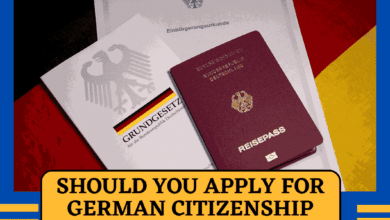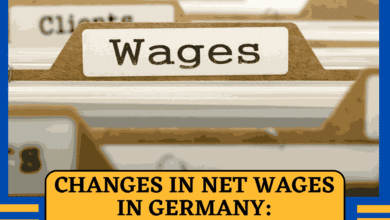Germany is Set for Early Election after Chancellor Lose No Confidence in Parliament
Germany is Set for Early Election after Chancellor Lose No Confidence in Parliament
It is a huge setback for the political landscape of Germany due to Chancellor Olaf Scholz losing a vote of confidence in the Bundestag. The verdict has led to the formal dissolution of parliament as well as opening up the floodgates for early federal elections scheduled on 23rd February 2025. This development has huge implications in the context of political stability, economic stability, as well as geopolitical stability within Germany. Here is all you need to know about what now when German Chancellor Lose Confidence Vote in Parliament.

Events that led to the confidence vote
1. Bundestag Confidence Vote Results
The Bundestag voted as follows:
-
-
-
- MPs against Scholz: 394
- MPs for Scholz: 207
- Abstained: 116
-
-
Scholz required at least 367 votes to win leadership, but he came short of that. This vote was called as part of the Vertrauensfrage (vote of confidence), a formal process by which the parliament would be dissolved once the Scholz traffic light coalition collapsed.
2. Collapse of the Traffic Light Coalition
The traffic light coalition was made of:
-
-
-
- Social Democrats (SPD) with leader Scholz
- Greens
- Free Democrats (FDP)
-
-
There was a disagreement over the fiscal policies and the unpopularity of economic governance. This led to a split in the coalition which triggered the confidence vote.
Early Elections Roadmap
1. Dissolution of Bundestag
After the failed vote, German President Frank-Walter Steinmeier now has 21 days to dissolve the Bundestag in writing. Dissolution then means that there must be new elections within 60 days. The date is, thus:
-
-
-
- Dissolution of the Bundestag expected on: 27th December, 2024.
- Federal election date: 23rd February, 2025.
-
-
2. Temporary Government
Scholz and his minority SPD-Green government will continue as caretaker till the time the elections are held for forming a new coalition. Elections are scheduled to be held six months in advance on September 2025.
Why the Coalition Broke?
1. Fiscal Policy and Debt Brake
The core reason for the collapse of the coalition is disagreement over Germany’s constitutional debt brake, which caps annual state borrowing at 0.35% of GDP. Scholz pushed through reforms that permit more public spending, an initiative that was rejected by FDP.
2. Situation went further downhill following a cabinet shake-up
Matters deteriorated even further when Finance Minister Christian Lindner of the FDP was relieved of his duties by Scholz on 6 November. This left the coalition even worse since the FDP pulled out and, without them, the government lacked the strength to hold a parliamentary majority.
3. Defence of Scholz’s Policies
Although the coalition has imploded, Scholz still defended his record in office, mentioning key achievements as follows:
-
-
-
- Modernizing the armed forces of Germany
- Support for structural economic reforms
-
-
Scholz demanded that clear investment be made in the German economy as the country is faced with tough challenges like the Ukraine war and global competition.
Opposition Criticism
1. CDU-CSU Stinging Reply
The conservative leader of the CDU-CSU alliance, Friedrich Merz, attacked Scholz’s leadership and the economic management of the coalition. He said that the government could not solve Germany’s economic problems, so there was a need to change the leadership.
2. Growing Popularity of the AfD
The far-right Alternative for Germany (AfD) has taken advantage of public dissatisfaction, particularly over immigration policies and economic issues. With 18-20% in recent polls, the AfD has emerged as the second-strongest political force, forcing mainstream parties to take notice.
Germany’s Political and Economic Challenge
1. Economic Pressures
Germany is experiencing increasing economic challenges that have forced the breakdown of the coalition, including:
-
-
- High energy costs: partly in the wake of the country decision to stop importing Russian gas.
- Slow economic growth: exposed to competition from rest of the world, which is still experiencing the worst effects of the Covid 19 pandemic.
- Disputes over the debt brake: restricting the capacity of the government to boost economic activity through public spending.
-
2. Geopolitical Uncertainty
Germany’s political crisis coincides with a world in crisis, including:
-
-
-
- Russia’s war against Ukraine, which is shaking European security.
- Uncertainty about NATO leadership and, in particular, former US President Trump’s chances of returning to power.
- According to political analysts, this is what has rocked the traditional German economic and political model into instability.
-
-
Role of the AfD
1. Background History
As a eurosceptic party, the AfD rose into the limelight after opposing open-door refugee policies pursued by Germany’s Chancellor Angela Merkel. To date, the party now campaigns for:
-
-
-
- No further immigration.
- Germany is too committed to the EU.
-
-
2. Consequences on the Political Front
Despite rising popular opinion, the mainstream parties persist with the “firewall policy” by refusing to consider a coalition with the AfD. However, the AfD’s rise has fractured the political landscape, and coalitions are increasingly becoming an issue.
Focus Areas for the Election Campaign
The election campaigns will concentrate on the major issues of concern to German voters. Political parties are likely to focus their strategies on the following areas:
1. Fiscal and Economic Reforms
Germany’s economic stagnation and the controversial debt brake rule will dominate the agenda:
-
-
-
- The SPD calls for the debt brake to be overhauled to allow for stronger public investment.
- The CDU-CSU, under Friedrich Merz, is strongly opposed to such reforms, sticking to fiscal discipline.
-
-
2. Energy Security
Germany’s disrupted energy supply after the Ukraine war has pushed prices to new heights:
-
-
-
- The SPD and Greens want a shift to renewable energy sources.
- The CDU-CSU and FDP advocate for a balanced policy in stabilizing costs.
-
-
3. Immigration Policies
Immigration remains a contentious issue:
-
-
-
- The CDU-CSU and AfD advocate for stricter border control.
- The SPD and Greens advocate for integration and addressing causes of root migration.
-
-
4. Germany’s Role in Europe and NATO
With unstable geopolitics, Germany’s position in NATO and the EU is critical:
-
-
-
- The SPD advocates for increased defense spending and commitments to NATO.
- The CDU-CSU advocates for a more robust foreign policy.
-
-
What’s Next for Germany?
Elections have raised several burning questions that are at the forefront of German politics, including the following:
-
- Can Scholz’s SPD regain the trust of the voters? The Olaf Scholz-led SPD must work towards regaining voter trust after the collapse of the coalition. Public dissatisfaction about economic stagnation and fiscal policies has destroyed trust and the SPD needs to recreate its image to make way for a political comeback.
- Can Friedrich Merz and the CDU-CSU Take Back Power? CDU-CSU, under the leadership of Friedrich Merz, leads in the polls, placing itself as a stable alternative to business. Friedrich Merz will appeal to those frustrated by Scholz’s government, thus bringing the momentum to regain power.
- How will the influence of the AfD increasingly change coalition politics? The far-right AfD continues to gain strength, with polls ranging from 18 to 20%. Even if mainstream parties refuse cooperation with the AfD, it still grows in influence and makes building a coalition harder while making the concerns of the voter with respect to immigration and security shine out.
Political Landscape
Germany’s once stable two-party system has cracked open in the last ten years.It has smaller parties such as the Greens and far-right AfD that increasingly are fragmenting the political landscape, giving manifestation to deep societal splits on issues like economic policy, social matters, and immigration.
This in turn makes coalition negotiations all the more complex.
-
- CDU-CSU is at the lead at 30-32%. Widespread dissatisfaction of voters with Scholz’s government helps CDU-CSU.
- The SPD at 15-17% has not regained its former voters.
- AfD, with 18-20% support, continues to reshape German politics by capitalizing on immigration and national security concerns.
- Greens, 11-14% in the opinion polls, are significant but have suffered counter-reaction because of their energy policy and failure of the coalition.
Loss of confidence vote has cast Germany into an era of political uncertainty. Elections would be held on February 23rd, 2024, to determine which course leadership the nation is to take. Olaf Scholz and his minority government will remain in office as a temporary solution, and the CDU-CSU and AfD will be left to profit from public discontent. The next German government will face the huge challenge of dealing with economic problems, geopolitical tensions, and a highly fragmented political landscape.
Read More at How to Abroad
Germany’s Housing Benefit to increase at the start of 2025
Deutschlandticket to increase to 58 Euros per month Starting in 2025









